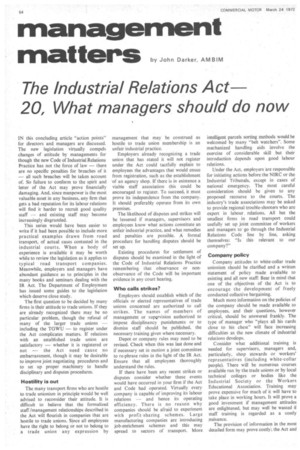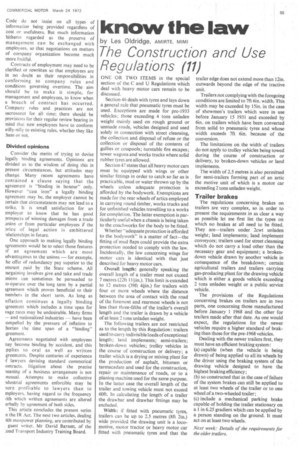management
Page 56

Page 57

If you've noticed an error in this article please click here to report it so we can fix it.
matters by John Darker, AMBIM
The Industrial Relations Act 20, What managers should do now
IN this concluding article "action points" for directors and managers are discussed. The new legislation virtually compels changes of attitude by managements for though the new Code of Industrial Relations Practice has not the force of law — there are no specific penalties for breaches of it — all such breaches will be taken account of. So failure to conform to the spirit and letter of the Act may prove financially damaging. And, since manpower is the most valuable asset in any business, any firm that gets a bad reputation for its labour relations will find it harder to recruit good quality staff — and existing staff may become increasingly disgruntled.
This series would have been easier to write if it had been possible to include more practical examples drawn from road transport, of actual cases contested in the industrial courts. When a body of experience is available it may be worth while to review the legislation as it applies to typical road transport companies. Meanwhile, employers and managers have abundant guidance as to principles in the many books and seminars dealing with the IR Act. The Department of Employment has issued some guides to the legislation which deserve close study.
The first question to be decided by many firms is their attitude to trade unions. If they are already recognized there may be no particular problem, though the refusal of many of the larger trade unions — including the TGWU — to register under the Act complicates matters. If relations with an established trade union are satisfactory — whether it is registered or not — the Act need cause no embarrassment, though it may be desirable to improve joint negotiating procedures and to set up proper machinery to handle disciplinary and disputes procedures.
Hostility is out The many transport firms who are hostile to trade unionism in principle would be well advised to reconsider their attitude. It is difficult to believe that the formalized staff/management relationships described in the Act will flourish in companies that are hostile to trade unions. Since all employees have the right to belong or not to belong to a trade union any expression by management that may be construed as hostile to trade union membership is an unfair industrial practice.
Employers already recognizing a trade union that has stated it will not register under the Act could tactfully explain to employees the advantages that would ensue from registration, such as the establishment of an agency shop. If there is in existence a viable staff association this could be encouraged to register. To succeed, it must prove its independence from the company. It should preferably operate from its own premises.
The likelihood of disputes and strikes will be lessened if managers, supervisors andemployees know what actions constitute an unfair industrial practice, and what remedies and penalties are possible. A formal procedure for handling disputes should be set up.
Existing procedures for settlement of disputes should be examined in the light of the Code of Industrial Relations Practice remembering that observance or nonobservance of the Code will be important evidence in any court hearing.
Who calls strikes?
Employers should establish which of the officials or elected representatives of trade unions concerned are authorized to call strikes. The names of members of management or supervision authorized to impose disciplinancy punishments or to dismiss staff should be published, the necessary training given where necessary.
Depot or company rules may need to be revised. Check when this was last done and if necessary set in motion a joint committee to re-phrase rules in the light of the IR Act. Ensure that all employees thoroughly understand the rules.
If there have been any recent strikes or disputes consider whether these events would have occurred in your firm if the Act and Code had operated. Virtually every company is capable of improving its labour relations — and hence its operating efficiency. There is no reason why companies should be afraid to experiment with profit-sharing schemes. Large manufacturing companies are introducing job-enrichment schemes and this may spread to sectors of transport. More intelligent parcels sorting methods would be welcomed by many "belt watchers". Some mechanized handling aids involve the exercise of considerable skill but their introduction depends upon good labour relations.
Under the Act, employers 'are responsible for initiating actions before the NIRC or the Industrial Tribunals, except in cases of national emergency. The most careful consideration should be given to any proposed recourse to the courts. The industry's trade associations may be asked to provide regional trouble-shooters who are expert in labour, relations. All but the smallest firms in road transport could usefully set up joint committee of workers and managers to go through the Industrial Relations Code line by line, asking themselves: "Is this relevant to our company?"
Company policy Company attitudes to white-collar trade unionism should be clarified and a written statement of policy made available to existing and all new staff: Bear in mind that one of the objectives of the Act is to encourage the development of freely conducted collective bargaining.
Much more information on the policies of the company should be made available to employees, and their questions, however critical, should be answered frankly. The type of manager who "plays all his cards close to his chest" will face increasing difficulties as the new climate of industrial relations develops.
Consider what additional training is needed for supervisors, managers and, particularly, •shop stewards or workers' representatives (including white-collar people). There wilt be numerous courses available run by the trade unions or by local technical colleges or bodies like the Industrial Society or the Workers Educational Association. Training may prove expensive for much of it will have to Lake place in working hours. It will prove a good investment if management attitudes are enlightened, but may well be wasted if staff training is regarded as a costly nuisance.
The provision of information in the most detailed form may prove costly; the Act and Code do not insist on all types of information being provided regardless of cost or usefulness. But much information hitherto regarded as the preserve of management can be exchanged with employees, so that negotiations on matters of company organization become much more fruitful.
Contracts of employment may need to be clarified or rewritten so that employees are in no doubt as their responsibilities in conforming to company rules and conditions governing overtime. The aim should be to make it simple, for management and employees, to know when a breach of contract has occurred. Company rules and practices are not sacrosanct for all time; there should be provisions for their regular review bearing in mind that new employees have to conform willy-nilly to existing rules, whether they like :hem or not.
Divided opinions
Consider the merits of trying to devise legally binding agreements. Opinions are divided as to the wisdom of doing this in present circumstances, but attitudes may change. Many recent agreements have contained a clause saying that the agreement is "binding in honour" only. However "cast iron" a legally binding agreement may be, the employer cannot be certain that circumstances may not lead to a strike. It is small satisfaction for an employer to know that he has good prospects of winning damages from a trade union or from particular employees if the price of legal action is embittered .elations hips in future.
One approach to making legally binding tgreements would be to select those features )f an agreement which are most tdvantageous to the unions — for example, he offer of redundancy pay superior to the tmount paid by the State scheme. All xargaining involves give and take and trade mions can sometimes be persuaded to :0-operate over the long term by a partial tgreement which proves beneficial to their nembers in the short term. As long as nflation continues a legally binding tgreement which includes a time span for vage rates may be undesirable. Many firms — and nationalized industries — have been :ompelled by the pressure of inflation to horten the time span of a "binding" tgreement.
Agreements negotiated with employees nay become binding by accident, and this ipplies to oral as well as written .greements. Despite centuries of experience if lawyers devising standard commerical ontracts, litigation about the precise leaning of a business arrangement is not !nusual. Attempts to make collective adustrial agreements enforcible may be 3ore profitable to lawyers than to mployers, having regard to the frequency /Rh which written agreements are altered erbally by agreement of both sides.
This article concludes the present series n the IR Act. The next two articles, dealing 6th manpower planning, are contributed by guest writer. Mr David Barnett, of the '..oad Transport Industry Training Board.




















































































































































